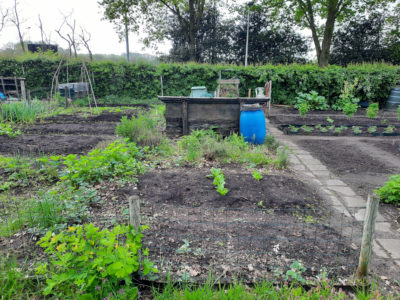Gardening brings a momentum to my life right now. May means it’s time to get my boots on and do some sorting down at my allotment. I’m still in my post Covid recovery, so it’s good exercise but really hard work, but nature’s clock marches on. I‘m of that age when I’m just happy growing cabbages, and get the same degree of pleasure from a bumper crop of courgettes as I used to with the release of a new Radiohead album.
Why do I do it? Well, it’s for all the beauty of the fresh air, growing my own food, and the camaraderie with fellow gardeners. Despite the show-offy-ness of having the best spring onions, the thing that matters most is the humanity. On the surface, tending an allotment is about growing something edible, but there is much more to it. It’s really quite simple, growing your own stuff from scratch. Like a startup.
There is nothing quite like a morning spent with soil under your fingernails. In the physical work, adapting to the seasons. I find something truly cathartic. Having my own third of an acre calms me. Enthuses. Uplifts. Invigorates. Like any startup, my plot is a constant work-in-progress. It never reaches anywhere other than this moment. There is always work to be done, and just like a startup, I come to understand some things work some don’t.
I’m surrounded by people who have had their plots for many years, and I often turn to them for advice. It’s like a startup community, I was given a gift of beetroot and rhubarb in the first few weeks when I started, as I think they felt bad I was working so hard but not seeing anything grow! I had great potatoes last year – lovely early Charlottes, and the king of all potatoes, Golden Wonder, triumphant as any potato must be when it has a brand of crisps named after it.
Like a startup, your plot is your own space. Choose your plants and plan; raise seeds and propagate cuttings. It’s a mix of meditation, therapy, and exercise. I am filled with eternal optimism as I look forward to the weeding, watering, and hoeing to grow vegetables I’ve chosen this year with the alluring names of Lady Balfour (potatoes), Bull’s Blood (beetroot) and Hurst Green Shaft (peas). There is peace and tranquillity from your efforts, until you wipe the sweat off your brow and put soil in your eyes.
It’s a community. There is chatter, followed by silence, apart from the sound of spades entering the earth, grunts of human effort, singing of the birds, and the sound of Amazon delivery vans passing by. The church bells ring on the hour, and every siren sounds ominous. When it’s time for a rest, getting the tea flask out is a marker of achievement that morning.
There might be a slight manic quality to all this. I push the broad beans into the damp earth, knowing that soon they will push their way back out, curling up towards the light like Jack and the beanstalk. So much of my allotment – like a startup – happens inside my head where I have created my own idealised Monty Don playground. I watch Gardeners’ World, which is pure horticultural porn, filled with pictures of vast vegetable beds, and I try to work out how I can come up with something comparable in my not-vast north Wales patch.
It is just like a boot strapped startup. I like the DIY aspect of growing my own. I like its slightly solitary, independent spirit, the way no one can stop you doing what you want, the way that you don’t have to be an expert. I like the make-do-and-mend mentality, which has us planting seeds in old margarine tubs, starting herbs in old Amazon cardboard boxes, and using old tin cans to start my tomatoes off – making something out of nothing.
The allotment is just like a startup incubator, a valuable space for allotment holders to socialise, share ideas, swap produce, and generally find a wealth of good feelings. Everyone is there to grow their own produce, but everyone has a bit of advice to others. A mix of people who perhaps ordinarily wouldn’t meet and mix together but share a common bond. Whether you’ve been developing your own business or growing vegetables, you know what I’m talking about, in a general sense.
But I’ve realised that these two pursuits have a lot in common that binds them together. Swap out ‘plants’ for ‘employees’ or ‘projects’, and you’ve got a pretty good idea of what working your startup is all about. Your best product ideas can fall flat, new people don’t work out, and unexpected things happen and throw a spanner in your flow. On the other hand, sometimes the straggler can turn into a star if given some nurturing and room to grow.
So grow, baby, grow – either your asparagus or your startup – here are ten things to keep an eye on.
1. First, plant the seeds If you want customers for your business, you have to start by planting and nurturing seeds. Those seeds include networking, building a website, creating content to get your brand out there, going to meetups, blogs, and podcasts. Some seeds will sprout quickly, others need time to germinate. It’s all part of the startup process. You can’t just scatter a bunch of seeds around and then sit around expecting a garden to appear. It takes time and effort.
2. Keep an open mind My first year at the allotment was trial and error, working out what grew well in the soil, the need for manure and watering. Anyone who has launched a startup understands this embryonic process of trial and error. Your venture is all about learning and testing, figuring out which services resonate in your chosen market.
Whether it’s plants or people, you’re dealing with living things that tend to have minds of their own, so stay flexible. You may think something’s going to turn out one way, but that doesn’t mean it will. Equally, just because something isn’t exactly where you want it doesn’t mean you have to yank it out, either. Plants can be dug up and relocated if you think they’d do better in a different location. Good employees can be moved to a different role if you think they’d excel there.
3. Be patient You can’t grow a garden overnight and, despite what many businesses claim, there’s no such thing as ‘overnight success’. Things take time, and you probably won’t see results for a while. That doesn’t mean you need to constantly tend your allotment under or give up on your startup immediately.
Just so you know: Things aren’t going to turn out the way you originally planned. They just aren’t. You can’t completely control how things grow, and you have to be okay with that. Some plants (and people) are slow starters, and it takes years before they reach their full potential.
4. Timing is everything To everything, there is a season on the allotment, and you have to be organised to ensure you do the things when they need doing. There is a cycle of growth in nature, just as there is in business. Inevitably there will be times when it’s all planning and nothing to harvest – just like your startup, when you’re working hard but not generating revenue. Make a note of projects to do in these down times, like reviewing your web site content, don’t stand still, there are always jobs to be done.
5. Pruning and cutting back is important Often unproductive, wandering, spindly offshoots can sap food and water from your runner beans, just as some customers take up your time, detracting from your ability to service genuine, higher-value customers. You know them, they always want to ‘pick your brain over a cup of coffee’ when all they really want is just free advice. They make work for you that won’t move your business forward, so prune back to give yourself the best chance of success.
Sometimes things just don’t work out, and you have to be willing to make hard decisions. Don’t let a bush in the wrong place crowd out other plants and keep them from thriving–move it, trim it, or get rid of it entirely. It’s hard to do that with anything you’ve seen grow, but it’s a necessity of keeping your garden or business healthy.
6. Get a routine A productive allotment needs structure and process, and you need to get out there when you’re not in the mood. Maintaining an allotment is a year-round project which requires planning. Seeing a project through from start to finish or, in allotment terms, from planting to harvesting, is extremely rewarding, so ensure you have the required processes in your startup. Successful entrepreneurs have discipline in that they are relentlessly focused on moving forward in some way everyday, and making sure they make it happen.
7. You have to get your hands dirty It’s obvious for the allotment, but metaphorically for your startup, you have to do some things you don’t want to do to reap the harvest later. Not every project or customer will be fun, but the rewards should be worth it. If not, go back and prune and cut. And if your hands get dirty, clean them before you shake hands with your next customer.
8. There will be pests Invasive pests in the garden are a nuisance to say the least. If they become established and make communities for themselves, munching your produce, they can take up a lot of your time. It’s the same in your startup. If you make a bad hire, they can kill projects. The longer a pest is given free rein, the harder it will be to regain control, so prevent them or stop them early in their tracks before they do damage.
9. Embrace your failures Fennel is the one I’m most upset about as it is my favourite vegetable, and I would love to grow it successfully. I think I put it in too early last year, a victim of my ‘buy and seed straight away’ approach. I also lost 50% of my carrot crop to rabbits. I took the net up thinking they were strong enough – and carnage. An absolute massacre. What I am learning is the best gardeners do not nurture their allotment simply to prosper from its produce, they do so to continually learn from the process so they may become better over time. Take this lesson into your startup.
10. Grow, baby, grow The simplicity of an allotment is the same as a startup: Dig. Plant. Weed. Watch. Enjoy. Ok, there won’t be the intransigent bloody brambles and the superfast growing weeds, enjoying speeds faster than my rural broadband, but I can honestly say I’m so looking forward to seeing my broad beans flourish. So just like your startup, make investments today and enjoy some of the most peaceful and profitable times of your life.
This ragged patch of land, complete with a shambolic, old dusty shed is my sanctuary. The elders are here again this year, ploughing their productive furrows, but now there are others – people in their twenties, young families. No longer the province of ‘man in a flat cap’, gloating over his leeks, allotments have become colourful, multi-cultural spaces. It’s the same for startups – anyone can have a go, so try it!


